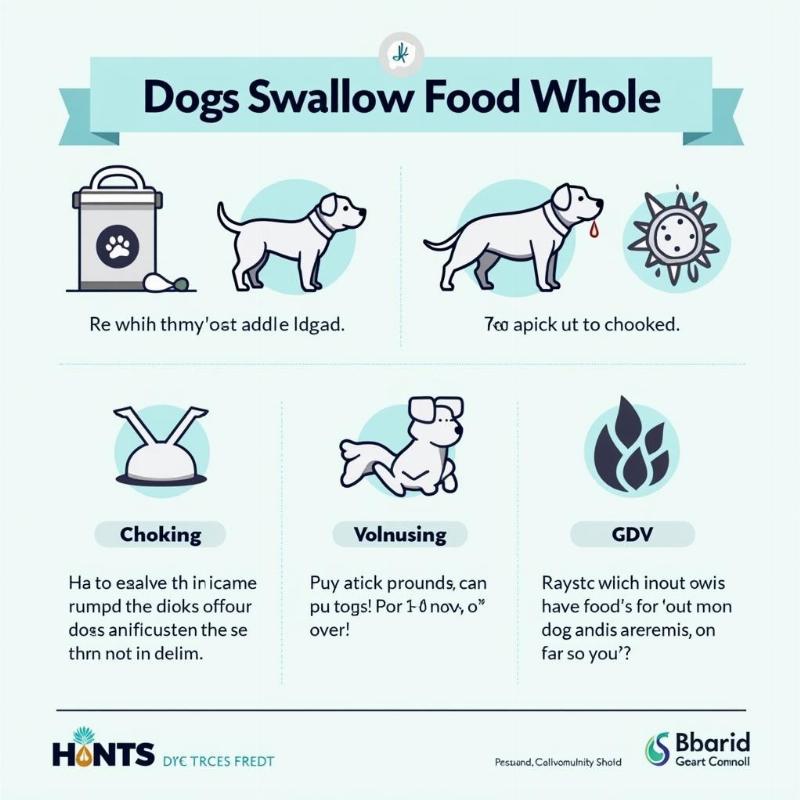Does your dog inhale their food like it’s the last meal on earth? You’re not alone. Many dog owners wonder, “Why does my dog swallow his food whole?” This behavior, while seemingly harmless, can lead to potential health issues. Understanding the reasons behind this habit is the first step to addressing it and ensuring your furry friend enjoys mealtimes safely.
Reasons Behind Your Dog’s Gulping Habits
Several factors contribute to a dog’s tendency to gulp down food. While some are related to instinct, others are influenced by the dog’s environment and past experiences. Let’s delve into some of the most common causes:
- Competition: In multi-dog households, competition for resources can lead to rapid eating. If your dog grew up with other dogs, they might have learned to eat quickly to avoid losing their share. This instinct can persist even when they’re the only pet in the home.
- Scarcity Mindset: Dogs rescued from shelters or situations where food was scarce may develop a habit of gobbling food down out of fear it will be taken away. This ingrained behavior can be difficult to break, even in a loving and food-secure home.
- Medical Conditions: Certain medical conditions, like hyperthyroidism or Cushing’s disease, can increase a dog’s appetite and lead to excessive food consumption and rapid eating. If your dog’s gulping behavior is sudden or accompanied by other symptoms like weight loss or increased thirst, consult your veterinarian.
- Breed Predisposition: Some breeds, particularly those bred for hunting or working, are more prone to gulping food due to their high energy levels and natural drive to consume food quickly.
- Boredom or Stress: Just like humans, dogs can engage in unusual behaviors when bored or stressed. Gulping food can be a way for them to alleviate anxiety or simply occupy their time.
The Risks of Gulping Food
While seemingly innocuous, swallowing food whole can pose several health risks to your canine companion:
- Choking: Large pieces of food can become lodged in the esophagus or trachea, leading to choking. This is a serious emergency that requires immediate veterinary attention.
- Vomiting: When a dog eats too quickly, they often swallow large amounts of air, which can lead to vomiting. Repeated vomiting can irritate the esophagus and cause discomfort.
- Gastric Dilatation-Volvulus (GDV): Also known as bloat, GDV is a life-threatening condition that occurs when the stomach fills with gas and twists. Large breed dogs with deep chests are particularly susceptible. While the exact cause is unknown, rapid eating is considered a risk factor.
 Risks of fast eating in dogs
Risks of fast eating in dogs
How to Slow Down Your Speedy Eater
Fortunately, several strategies can help slow down a dog’s eating habits and promote safer mealtimes:
- Slow Feeder Bowls: These specially designed bowls have obstacles that force dogs to eat around them, slowing their intake.
- Puzzle Feeders: These interactive toys dispense food as the dog plays, turning mealtime into a mentally stimulating activity.
- Hand Feeding: In severe cases, hand feeding can help control the pace of eating and reinforce positive mealtime behavior.
- Smaller, More Frequent Meals: Dividing your dog’s daily food allowance into smaller, more frequent meals can reduce their urge to gulp.
- Elevated Food Bowls: Raising the food bowl can make it easier for some dogs to swallow and digest their food.
When to Seek Veterinary Advice
If your dog’s gulping is a new behavior, accompanied by other symptoms, or if you’re concerned about potential health risks, it’s crucial to consult your veterinarian. They can rule out any underlying medical conditions and provide personalized advice on managing your dog’s eating habits.
Conclusion
Addressing your dog’s habit of swallowing food whole is essential for their health and well-being. By understanding the underlying causes and implementing appropriate strategies, you can help your furry friend enjoy mealtimes safely and reduce the risk of potential complications. Remember, patience and consistency are key to modifying this behavior and ensuring your dog’s long-term health. Why does my dog swallow his food whole? Now you know the answer and can take action!
FAQ
- Q: Is it normal for dogs to swallow their food whole? A: While some dogs naturally eat faster than others, swallowing food whole can be problematic and pose health risks.
- Q: Can gulping food cause my dog to choke? A: Yes, large pieces of unchewed food can become lodged in the throat and cause choking.
- Q: What type of slow feeder bowl is best for my dog? A: The best slow feeder bowl depends on your dog’s breed, size, and eating habits. Consult your veterinarian or a pet supply specialist for recommendations.
- Q: How can I prevent my dog from gulping food due to competition? A: Feeding dogs in separate areas can eliminate the sense of competition and encourage slower eating.
- Q: When should I be concerned about my dog’s gulping? A: If the behavior is new, accompanied by other symptoms, or if your dog is experiencing digestive issues, consult your veterinarian.
Related Articles
- slow feeder bowl for dogs
- my dog swallowed a treat without chewing
- dog food kibble size comparison
- dog ate underwear what to do
- dog faced puffer fish puffed up
Beautdogs.us is your premier online destination for all things dog-related in the US. We offer expert advice on dog breeds, care, and product recommendations. Whether you’re a seasoned dog owner or just starting your journey with a furry friend, Beautdogs.us provides trustworthy resources and a comprehensive guide to navigating the wonderful world of canine companionship. Contact us today for any inquiries! Email: [email protected], Phone: +1 501-555-7529.